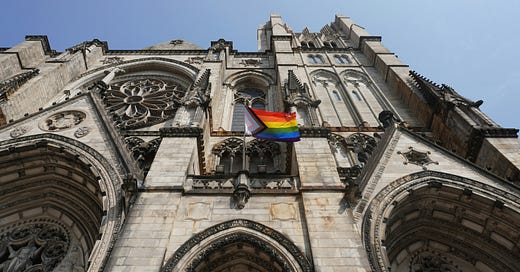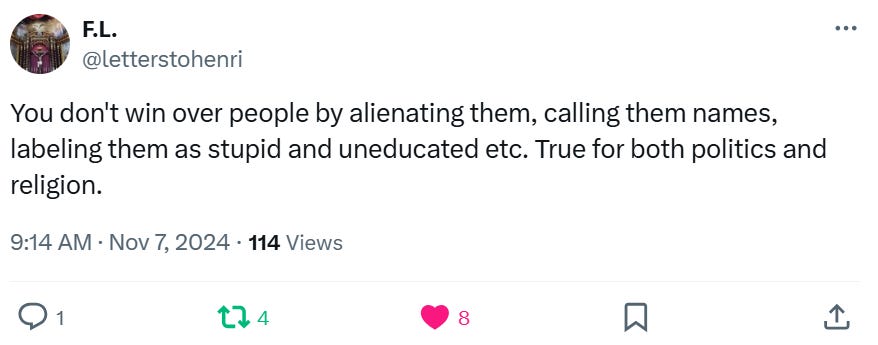Liberal Catholics: The call coming from inside the house
Why are so many Catholics adopting liberal beliefs? And how can we help?
Two and a half years ago, I “came out” as pro-life and faithful Catholic to a host of secular, functionally atheist friends and followers.
The fallout was tremendous (by my standards)—I lost almost all of my Twitter followers overnight, and by the end of the month, only one of my college friends was still speaking to me.

During that time of instant infamy, a good friend who was hurt and upset by my new beliefs remarked, “You must be getting a lot of support from your church. That’s why you think you can say this stuff.”
It was a fair assumption by someone who saw the world in black and white; according to her, anyone “inside” the church would have surely sided with me, while those “outside” the church fell on the other side. It was a fair assumption but also a false one. She might not have registered it through the haze of shock and betrayal, but a majority of the negative comments and adverse reactions to my posts were, indeed, by fellow Catholics.
Even today, following a renewed effort to share the Gospel and the teachings of the Catholic Church on social media, I observed the same trend. Many Catholics do not like what I post. Never mind that all I’m doing is reiterating what the Church herself teaches: they want nothing to do with it.
This phenomenon is sometimes referred to as ‘Liberal1 Catholicism’: there are many Catholics who do not, in fact, agree with the Church’s teachings on controversial topics. They believe that the Church should “get with the times”, and wait patiently for the Magisterium to come out and declare, for example, that abortion is not an immoral act after all, or that sex between two men should no longer be prohibited but celebrated, and other such statements that unbeknownst to them the Magisterium will never make.
Although the Catholic Church has infallibly shepherded Catholics for two thousand years, Catholics themselves are not infallible. I know this, and still, it’s jarring to face opposition from within our own folds. I’ve had seemingly devout Catholic aunties I’ve known since I was a kid tell me, “You’re being too old-fashioned.” People I went to Sunday School with avoid saying hi to me at Mass, perceiving me to be one of those hateful Catholic bigots they swear they’ll never become.
Having been on the receiving end of this kind of pushback, I can’t help but ask the question that no doubt many of you are asking. If you’re a faithful Catholic who truly embraces all of the teachings of the Catholic Church, you’re probably wondering, “Where are these Liberal Catholics coming from? How can they be so blind? And how can we stamp the liberalism out of them?
Well, I have a hypothesis, but you’re not going to like it.
We are part of the problem.
I’ve told this story many times, and maybe you’re sick of hearing it, but here goes:
When I was a baby Catholic with same-sex attraction, I took every chance I got to ask the question, “Does God say being gay is wrong?” I usually asked this question anonymously, but one time I blurted it out in confirmation class in front of eight of my peers and my teacher.
An awkward silence predictably followed, into which my confirmation teacher said, “Well, Krysanne, God made Adam and Eve, not Adam and Steve.” And that was all the answer I got.
Years later, after I came to know God in a personal way, read Theology of the Body for Beginners, and realised I had been mistaken in my understanding of human sexuality as a whole, I reflected on that moment in my confirmation class.
I thought about how, had I been in her position, I would have never said what she did—the “joke” was insensitive, unfunny, and, most importantly, not an answer. The “joke” made me feel alienated and small—I knew that the first two human beings God created had been a man and a woman. But then He created me, with these confusing desires, so what was I meant to do with them? Am I a mistake? Did God mess up while creating me? Was there no place for me here?
This wasn’t the only time I asked the same question and received an inadequate answer. Nobody was ever curious about why I was asking my question, or wanted to know the other questions that were hiding underneath—what am I meant to do with my desires? What about my friends who only experience attraction to the same gender, do they have to just live life alone? Why would a good God want someone to be alone?
Neither did they speak to the real fears I had—the fear of being alone forever, of being discriminated against within the Church.
Now, maybe you’re thinking to yourself, “I’d NEVER make such an insensitive comment.” And maybe you’re right, and I love that for you. But there are other ways in which faithful Catholics can be alienating to those of us who have not fully understood or accepted the teachings of the Catholic Church. Here are just some of those ways.
Fundamentalism disguised as piety

Many Catholics, in an effort to embrace their own version of holiness and distance themselves completely from the secular world, will prohibit others from doing what the Church effectively allows.2
They might say, “You should never listen to secular music.” “You must only receive Holy Communion on the tongue and never on the hand.” “Women must wear veils while attending Mass.” “Harry Potter is demonic.” “Drinking even one drop of alcohol is a sin.” And so on.
The problem with these things is not that it’s morally wrong, or even morally right, to do them. They just belong in that beautiful oasis of grey where the Church asks that we use our prudential judgment to decide what is and isn’t helpful for our holiness. What we aren’t meant to do, however, is translate our personal decisions into directives for others.
When we do this, we make it seem like our faith is all about following the rules. And, spoiler alert, people—especially young people—hate rules! If we’re heaping more and more rules on their backs, they’re going to want to break free from all of them—even if some of those rules are moral laws laid down by the Church.
Hypocrisy
As an ex-youth worker, I can tell you with certainty that hypocrisy is the #1 hurdle preventing young Catholics from going all in for Jesus.
Everyone knows a hypocritical Catholic: someone who teaches Sunday School but holds onto grudges for decades; who sings in the Sunday choir but wouldn’t lift a finger to help their neighbour. But what about closer to home—what about the hypocrisy in our hearts?
How many of us devote hours to raging against the culture on Instagram, but spend little to no time connecting with real Catholics in our daily lives? Do we pay lip service to the CCC instruction that we must treat LGBT people with love and respect, and then turn around and make derisive comments about the “rainbow brigade”? How often does our “hate the sin, love the sinner” approach lean more on the former and less on the latter?
If you think you’re making jokes about people who are stuck in sin—calling them pedophiles and baby murderers willy-nilly—to an audience of the righteous, think again. Because before I went public with my story, I blended into those audiences really well. And I witnessed many, many faithful Catholics refer to the LGBT community as “those people out there” whom we must be on our guard around and “protect our children from”. And it doesn’t matter if you’re being “technically correct” if it comes at the cost of losing a soul.
St. Paul says in Colossians 4:6— “Let your speech always be gracious, seasoned with salt, so that you may know how you ought to answer everyone.”
I think if all Catholics followed these directives, we’d have significantly fewer online Catholic commentators (I’m looking at you, Matt Fradd). Note also that Paul says ALWAYS: we must be gracious not just when we’re speaking to strangers whose views we aren’t yet sure of. But even in “our” circles, how we refer to different groups of people matters. Because they decide the disposition of our hearts when we do interact with them.
And trust me, if you aren’t loving someone fully, it shows.
Being conversation-phobic
This is a predictable consequence of failing to love others fully—especially those we disagree with, or those living immoral lives.
I see this a lot in the context of the abortion debate. Many Catholics have no qualms writing pro-choicers off as “baby murderers.” They believe that empathising with pro-choice talking points (like poverty, lack of a support system, mental health issues faced by the mother) is a sign of weakness. Instead, they would have us scream “Abortion is murder!”3 in their faces and refuse to engage in meaningful dialogue.
Well, yeah. If you’re calling your opposition something as reprehensible as “baby murderers”, it makes sense that you wouldn’t want to dialogue with them. The point is, however, that you aren’t winning any souls with those labels.
I get where Catholics who think this way are coming from. Part of my conversion story was me unlearning a lot of the “liberal” opinions I had held as a young adult; I went from being pro-choice to pro-life almost overnight. When your eyes are opened to the evils of abortion, and its ubiquity in Indian society (some of the women I went to college with had had abortions), disgust is a normal response.
The problem is when that disgust transfers over to people.
When I first “came out” as pro-life, I would share pro-life arguments on my social media regularly. I’m sure in a few of them, I referred to abortion as murder. A few months later, I met with a good friend for coffee. Over the course of the conversation, she tearfully told me about the time many years ago when she aborted her unborn child because there was a high chance of that child being born with Down’s syndrome. “I did not want my baby to suffer,” she said. “Does that make me a murderer?”

There probably exists a person out there who have said, “Yes, that makes you a murderer,”4 driving a sword through a broken mother’s already sorrowful heart. I, however, was only able to receive her story silently. She knew that it was wrong, but was coerced into it by her husband and family. She confessed the sin many times over the years that followed, but still did not believe that she was forgiven. It was a heart-breaking story that did not deserve my moral judgment, but a listening ear.
When we view our “opponents” as people too depraved, too evil to dialogue with, we fail to bring Jesus into the situation. Jesus, who shielded the adulterous woman from being stoned to death. Jesus, who called even a tax collector to join him. That Jesus would scoff at our dismissal of these people. He would remind us that we are meant to be a light to the world—but we can only be a light by entering into others’ darkness. We can only be salt by entering into tasteless food.
How to not be part of the problem
Our tendency towards fundamentalism, our hypocrisy, and our aversion to conversations all can drive people away from the Catholic Church. I believe this is why we see so many liberal Catholics around us: they are put off by what they see in their circles—seemingly faithful Catholics who do not practice what they preach, who refuse to sympathise with the other side, who make up unnecessary rules and heap them on the backs of others.
I’ll confess that there have been times when I’ve been guilty of these things too. So, how can we be better? How can we stop being part of the problem?
Here are some suggestions:
Spend less time online: Social media right now is all about 90-second videos. That’s enough time for an opinion, but not enough time for nuance. Real life is complicated and messy. Find a ministry in your parish you can get involved with; if you are already part of a ministry, be more present. Talk to people. Share your life with them. Become a real-life missionary, not just a virtual one.
Look inwards: Are there parts of the Gospel you haven’t fully internalised? Do you really believe that grace is a free gift from God, not something that we can earn by being good, rule-following Catholics? Spend time in the adoration chapel and ask God to make the Gospel more real for you.
Talk with people you disagree with: Don’t cut them out of your life, but listen to their stories without judgment. If you’re only surrounded by faithful Catholics: go join an exercise class or a book club, and make non-Catholic friends. This way, you’ll learn to have compassion for the other side (while still, of course, retaining your values.)
This list is not exhaustive, but I’ve found each of these things to help me over the past few years.
Lastly, if you found this newsletter helpful, would you consider sharing it?
And drop a comment to keep the conversation going.
In Christ,
Krys
I’m not a huge fan of co-opting American political terms for Indian Catholic conversations. I do align with many “liberal” values, like justice and equality. I believe that we should uplift the poor and do everything we can to decrease suffering. I believe that the Church must be separate from the state (and yet we must demand good Christian values of the state). I believe a secular society can still reflect God’s law. So when I use “Liberal” here, I mean it only for the brand of Catholics who directly oppose the fundamental teachings of the Catholic Church.
I wrote about this in detail in an earlier post: But daddy I love her: On being a Christian Swiftie
This will become evident later, but I’ll say it here anyway: I despise that statement, and I’m automatically put off by groups or people that will use that slogan as part of their pro-life activism. What we need are springboards to initiate meaningful conversations, not statements designed to provoke outrage and name-calling.
Some might make the distinction that while abortion is murder, it isn’t the mother who is the murderer but the abortionist. I assure you, however, that your statement without this necessary caveat is hurting more mothers than it is hurting abortionists.





Thank you! This is evergreen. TBH it’s hard to share because sending it to someone implies “I think you’re not charitable enough and need fraternal correction” but it’s a great tool for when that moment arises. And it is a very inspiring witness to how your own mind and heart changed and became healthier over time.
Thanks Krys!! Someone just needed to say this and I’m glad you did. There is too much noise within the Catholic world. Some people in particular aren’t really sharing the Gospel but their version of the Gospel. Not the Truth but their version of the Truth. And in all of this- the message is lost.